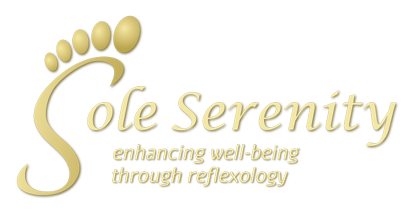What is Reflexology?
Reflexology is thought to stimulate the body to restore its natural balance which becomes disrupted when we are ill.
As a complementary therapy, reflexology may be used with great effect alongside standard medical care.
Reflexologists believe that specific areas of the feet or the hands, called reflexes, relate to specific organs in the body.
Using different techniques with the thumbs or fingers, reflexologists apply pressure to reflexes on the feet or hands. It is thought that nerve and blood supply to the actual organs is then stimulated. This may assist with, and speed up, the natural healing process.
Reflexology can bring about a state of deep relaxation, allowing the body to rest both mentally and physically. Stress alone is thought to cause 75% of all physical illnesses.
As it is a holistic therapy, reflexologists are concerned with clients' physical, emotional and spiritual well-being, which all impact on their health.
Modern day reflexology is based on the work of American physiotherapist, Eunice Ingham (1889-1974). She developed and refined previous theories of American doctors, William Fitzgerald and Joe Shelby Riley.

